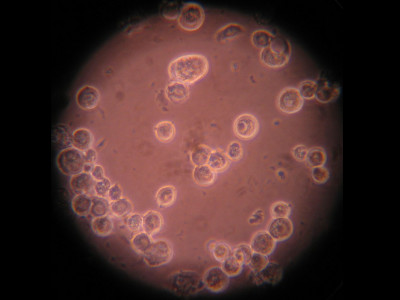Previous cancer drugs are likely to have attacked misplaced targets

by
To date, many researchers and medical professionals have developed various cancer treatments and drugs, but cancer remains a threat to humanity. From the accidental discovery of such cancers and cancer treatments, it became clear that 'the previous cancer treatments are likely to have attacked misplaced targets.'
Off-target toxicity is a common mechanism of action of cancer drugs undergoing clinical trials | Science Translational Medicine
https://stm.sciencemag.org/content/11/509/eaaw8412
Many cancer drugs aim at the wrong molecular targets
https://www.nature.com/articles/d41586-019-02701-6
Why Aren't There Better Cancer Drugs? Scientists May Have Picked the Wrong Targets-The New York Times
https://www.nytimes.com/2019/09/11/health/cancer-drugs-proteins.html
Researchers from cancer researchers Jason Scherzer and others at the Cold Spring Harbor Laboratory found out that accidental discoveries have found that traditional therapies were attacking the wrong subject. Scherzer was initially studying a protein called MELK, which is produced by cancer cells, in order to develop diagnostics rather than breast cancer treatments.

by
MELK is an abbreviation for “Maternal Embryonic Leucine Zipper Kinase”, a protein often found in ongoing breast cancer cells. For this reason, MELK is considered to be an indispensable protein for cancer cell growth, and in fact, MELK inhibitor OTS167 has been highly effective as a treatment for breast cancer.
Scherzer et al. Excised the gene that produces MELK from cancer cells using the genome editing technology CRISPR–Cas9 to test cancer cells that have stopped growing. However, contrary to Scherzer's expectation, cancer cells continued to grow after they stopped producing MELK. Oddly enough, when a MELK inhibitor was administered, the cancer cells stopped growing as expected, despite the fact that they were unable to produce MELK.
Scherzer then administered OTS964, an inhibitor that targets the TOPK protein, to colonies of cancer cells. As a result, most of the cancer cells died, but some cancer cells survived. When Scherzer examined the surviving cancer cell genes, a mutation was found in a gene called CDK11, so I tried to remove the CDK11 that was mutated from the cancer cell gene. Then the cancer cells were killed easily.
Scherzer conducted a similar test with a total of 10 therapeutics targeting 6 proteins to see if the phenomenon that occurred in OTS167 or OTS964 was accidental. The cancer drugs tested by Scherzer have been confirmed to be effective in 29 clinical trials involving a total of over 1000 people, and more than 180 papers and research publications have mentioned their efficacy. The

by
However, as a result of the test, it was found that all 10 types of cancer drugs were effective in cancer cells that did not have the protein of interest. From this, Mr. Scherzer concludes that “the effect of the conventional“ molecularly targeted therapeutic agents ”that target proteins in cancer cells is unrelated to the target protein. However, it is an unmistakable fact that therapeutic drugs are effective, and the reason why 'therapeutic drugs unrelated to the target protein are effective' remains unclear.
Scherzer believes that the reason is “conventional drugs are made using RNA interference technology, which is less accurate than CRISPR”. RNA interference is a technology that suppresses the expression of specific genes by artificially synthesized short double-stranded RNA .

by Darwin Laganzon
To be sure, RNA interference can be used to suppress a gene, but it may suppress a gene different from the target gene or cause another gene to be expressed. For this reason, Scherzer said, “Therapeutic drugs tested with RNA interference technology act on a protein that is completely different from the protein produced by the targeted gene to suppress cancer cells. I think that removing these genes would not have any effect. ' However, CRISPR may act on genes different from the target, so the CRISPR test results are not generally correct.
Scherzer said, “A new frontier of molecular targeted therapies is spreading. If we verify the effects of conventional therapies using technologies such as CRISPR, we will be able to find the true target.” He talked about the idea of further research on CDK11, which has been found to actually act on cancer cells.
Related Posts:
in Science, Posted by log1l_ks







